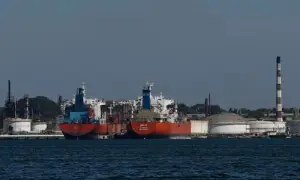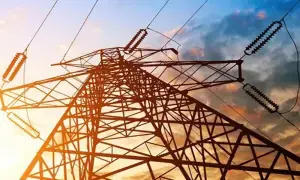First cargo of Russian crude oil for Pakistan reaches Karachi
5 min readThe first cargo of Russian crude oil for Pakistan reached Karachi on Sunday, as the country tries to look for avenues to address its energy needs. The ship anchored at the Karachi port with 45,142 metric tons of crude oil.
“Glad to announce that the first Russian discounted crude oil cargo has arrived in Karachi and will begin oil discharge tomorrow [Monday],” Prime Minister Shehbaz Sharif tweeted.
Pakistan, the world’s fifth most populous country, faces chronic energy shortages and imports 84 per cent of its petroleum products, overwhelmingly from Gulf Arab allies Saudi Arabia and the United Arab Emirates. The energy-crunch country imported 154,000bpd of oil in 2022, broadly flat from the previous year, data from analytics firm Kpler showed.
“This is the first ever Russian oil cargo to Pakistan and the beginning of a new relationship between Pakistan and Russian Federation,” the premier added.
The Russian crude oil tanker, which managed to reach Sindh’s capital before the cyclone, would deliver the fuel to Oil Pier 2 of Karachi Port, sources told Aaj News.
PM Shehbaz described the development as a “transformative day”.
“We are moving one step at a time toward prosperity, economic growth, and energy security & affordability,” he said and commended all those who remained part of the efforts to import Russian oil.
Pakistan refinery would handle the shipment, reported Radio Pakistan. Another shipment carrying 50,000 metric tons of crude oil would reach Karachi next week, the state-run news broadcaster added.
A port official told Reuters on Sunday evening that the oil was in the process of being unloaded.
There has been no confirmation of how payment would be made, but Pakistan recently announced a plan to allow barter trade with Russia, Afghanistan and Iran, which analysts said could reduce the need for dollars and the risk of cross-border smuggling of energy products.
In April, junior petroleum minister Musadik Malik said that the government would place its first order for Russian crude next month and it would take another four weeks for the commodity to reach Pakistan.
“Several agreements with Russia had been reached and Pakistan will place an order next month. But it will take some time for the oil to reach Pakistan … nearly 26 to 27 days,” he said in an interview on Geo News programme Jirga. “The commodity will arrive in the country via sea.”
Pakistan is facing 8% to 9% of gas depletion every year from its own reserves, according to the government.
Malik had flown to the energy-rich country in November last year for talks on issues including oil and gas supplies. The trip had come as the South Asian nation looked for discounted fuel options amid the increase in the oil prices and dwindling reserves, determining the energy payments, mostly for oil.
The trip, according to Malik was successful, as the country had agreed to provide crude oil, petrol, and diesel to Pakistan, in principle, at discounted rates. “The Russian government is setting up new factories for the production of LNG and they have invited Pakistan to begin talks on long-term contracts for 2025 and 2026,” Malik had said after coming back home.
Moscow has eight types of crude oil, out of which two would be used by Pakistani refineries. Below are the details of types of oil and Pakistan companies’ status are as follows:
- Sokol (Siberian light) and Ural are the two types that can be refined in Pakistan
- Pakistan Refinery Ltd (PRL), which is owned by the PSO, can use up to 50 per cent light crude oil of Russian origin
- Parco (Pak-Arab Refinery Limited) said it can use up to 30%
- Cnergyico said not only can it use the two light crude oils but also the other six crude oils
Earlier this year, Pakistan and Russia agreed to sort out all the entanglements – transportation, insurance, payment, and rolling – for a supply of crude oil by late March. The two sides had signed memoranda of understanding (MoUs) when Russian Energy Minister Nikolay Shulginov-led delegation visited Pakistan.
Russia’s piped supply of Urals crude to the European Union via the southern Druzhba pipeline in June is set to increase by 16% compared to May as EU refiners seek to secure more oil amid fears of disruptions in transit via Ukraine, two sources told Reuters earlier this week.
The South Asian country has defended its approach to reaching out to Kremlin for the cheap fuel amid the Ukraine war. The petroleum ministry has claimed that they have not faced any problems, either with the United States or with any other country.
Historically the South Asian country has had no major commercial relations with Moscow, unlike neighbouring India, hence payment mechanisms in light of Western-led financial sanctions on Russia are likely to present a challenge.
Pakistan depends on oil from Gulf countries, mainly due to close political and friendly ties, which often extend facilities like deferred payments, and that route is cheaper logistically given proximity to the Strait of Hormuz.
Pakistan is one of the nations most vulnerable to climate change, with floods last year submerging one-third of the country. A 2020 World Bank study said Pakistan could meet all electricity demand at the time by devoting just 0.071 per cent of its land to solar power.
How is crude oil turned into finished products?
Crude oil, a mixture of different chemicals, is an unrefined petroleum product. It is often a dark, sticky liquid that cannot be used without changing it. It is found accumulated in various porous rock formations in Earth’s crust.
The first part of the refining crude oil was to heat it until boils, according to the World Petroleum Council. “The boiling liquid is separated into different liquids and gases in a distillation column. These liquids are used to make petrol, paraffin, diesel fuel etc,” it said.
Then, the boiling oil turns into a mixture of gases in the column. They flow up the column where they cool down until they condense (turn back into liquid again).
The separated liquids and gases are used to make many products.
“Liquids from refining oil still have to be changed to make them more useful. Sometimes it’s to make them clean enough to be used. Sometimes it’s to turn some of the unwanted liquids into things people want to buy,” it added.
The heavier liquids are in less demand from customers so are turned into lighter products that are in demand. One of the processes is called catalytic cracking. It breaks down some of the heavy liquids from the distillation column.
The heavy liquids are changed into simple and more useful liquids and gases. Cracking is just one of many chemical changes in an oil refinery.
For the latest news, follow us on Twitter @Aaj_Urdu. We are also on Facebook, Instagram and YouTube.




























Comments are closed on this story.